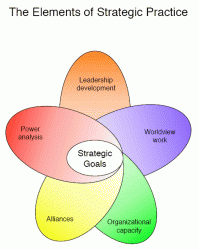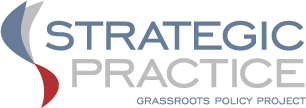Our Projects
GPP’s projects reflect current opportunities in our side-by-side consulting to apply strategy development tools to the immediate issues that groups are working on. Together, we strive to turn current challenges into opportunities to advance longer-term goals.
Strategic Practice
 Our tools for developing more strategic approaches to social change are tailored for the immediate concerns and organizational imperatives of the groups with work with. In order to align practice and strategy, groups need dedicated spaces where members and leaders engage in analysis, action and reflection. Our case study about ISAIAH illustrates what we mean by aligning practice with long-term strategy.
Our tools for developing more strategic approaches to social change are tailored for the immediate concerns and organizational imperatives of the groups with work with. In order to align practice and strategy, groups need dedicated spaces where members and leaders engage in analysis, action and reflection. Our case study about ISAIAH illustrates what we mean by aligning practice with long-term strategy.
Strategic inquiry: case study of our work with National People's Action (NPA).
Our writings about strategic practice include:
- Overview: Strategic Practice for Social Transformation
- Strategic Practice for Social Transformation
- Power and Social Change
- Strategic Planning and Strategy Development
Racial Justice
 Race and class are key variables in shaping and reinforcing existing social and economic relations. They are constructed and maintained within and through the political economy. Groups that are interested in economic justice need to delve more deeply into all aspects of racism, especially structural racism and the complex history of racialization in the United States. For these reasons, we bring racial justice analysis into our economic justice analysis — not as an ‘add-on,’ but as a fundamental way of addressing the intersections of racial and economic oppression; how racism is woven into economic structures and practices, and how trying to change economic practices without addressing racism is a losing strategy.
Race and class are key variables in shaping and reinforcing existing social and economic relations. They are constructed and maintained within and through the political economy. Groups that are interested in economic justice need to delve more deeply into all aspects of racism, especially structural racism and the complex history of racialization in the United States. For these reasons, we bring racial justice analysis into our economic justice analysis — not as an ‘add-on,’ but as a fundamental way of addressing the intersections of racial and economic oppression; how racism is woven into economic structures and practices, and how trying to change economic practices without addressing racism is a losing strategy.
Our materials about racial justice and structural racism include:
- Race, Power and Policy: Dismantling Structural Racism
- A Structural Analysis of Oppression
- Race and the Role of Government
The Center on Race, Religion and Economic Democracy (C-RRED)
C-RRED is a project sponsored by our sister organization, the Commonwealth Institute. C-RRED draws upon a long-standing tradition of liberatory theological inquiry about social, economic and racial justice, rooted in beliefs about human dignity and interconnectedness. C-RRED brings together religious leaders, other scholars and community organizers across sectors to engage in a robust theological inquiry. A core set of issues that sit at the intersections of race and economic justice is mass incarceration.
Corporate Power and Political Economy
 We are three years into the worst economic crisis since the Great Depression. Instead of addressing the underlying causes of the crisis and moving toward a more just and sustainable economic foundation, our national legislators seem more determined than ever to expand Wall Street and corporate domination of both politics and the economy. Meanwhile unemployment rates and foreclosures remain high and inequality grows.
We are three years into the worst economic crisis since the Great Depression. Instead of addressing the underlying causes of the crisis and moving toward a more just and sustainable economic foundation, our national legislators seem more determined than ever to expand Wall Street and corporate domination of both politics and the economy. Meanwhile unemployment rates and foreclosures remain high and inequality grows.
At the same time, the crisis provides us with a rare opening for advancing a new economic vision that has the potential to transform social and political, as well as economic, relations in our society.
Our project on corporate power and the political economy helps groups shape their own narratives about what an economy is for and the role of communities, workers, corporations and government in creating and maintaining an economy that works for all of us.
Political economy. We use “political economy,” as opposed to “the economy,” very intentionally. In conventional discourses about economics, the economy is a naturalized thing, governed by ‘free market’ principles and existing in a separate sphere from politics, culture and social institutions. This discourse overlooks many aspects of economic relations, which are about much more than markets. The ‘economy’ is not a thing; it is a way of describing socially constructed relationships and forces in society. To understand the economy, we have to look at the relationships between markets, social institutions and relationships, history and culture, and the role of government, of political and economic power, and race and class dynamics.
Corporate Power. In the early years –– from the 1780s until the 1850s, states established provisions to prevent the rise of powerful corporations and financial institutions. The main way they did this was through state charters that regulated their activities and held them to a public purpose. Over time, corporations have shed the idea of public purpose as their power and influence in American life has increased. They have used the great dividing forces of race and immigration to protect their profits and exert control over their workers.
The largest and most powerful corporations have severed their ties with communities and the nation, a development that is profoundly threatening to our democracy. That is not to say that corporations do not serve useful functions, or that they have not contributed to efforts to make our communities and society better. But the current system is tailored to the interests of the largest corporations, with no sense that they are accountable to any public purpose.
A systemic analysis that places the economy in its social and political context helps us better understand today’s corporate-dominated economy, how we got here, and how we can move towards a new economy.
Our writings on corporate power include:
- Corporations and the New Economy
- Financial Markets and the Real Economy [coming soon]
- The Economics of Collapsing Markets
- From Levittown to Meltdown
Click here for a more complete listing of our writings related to these projects.

